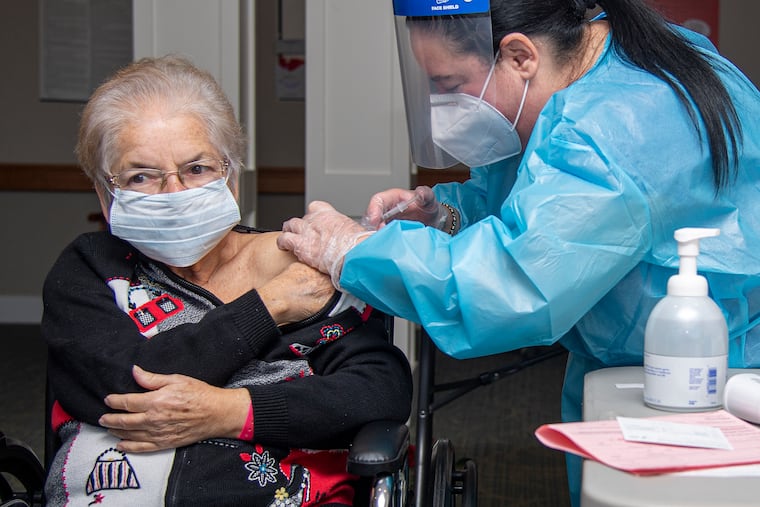As long-term care facilities remain ravaged by COVID-19, staff and residents wait too long for vaccines | Opinion
For too many people living and working in long-term care, the vaccine came far too late.

On Dec. 17, the day before ER doctor Nashat Latib was supposed to get the COVID-19 vaccine, she tested positive for the virus.
For months, the Mount Airy native — practicing in Houston — had sweated under layers of PPE to treat some of the sickest COVID patients, who had sneezed, coughed, and spat on her. Then, finally — finally — the miracle she had been waiting for was here: a vaccine. But she was one day late.
“I felt so defeated,” she told me. “I had been on the front lines since day one, and I’d been so careful.”
She isn’t the only person who has experienced such a twisted twist of fate, with heartbreaking implications for at-risk patients and workers. Pick any point in this tragic timeline: On Jan. 15, just days before vaccine eligibility extended to residents aged 65 and up, the state’s weekly report included 1,400 additional COVID deaths among Pennsylvanians in this age group.
The just-missed timing is particularly painful for long-term care facilities: In December, as Pennsylvania began vaccinating residents of nursing homes, long-term care facilities in the state reported the highest number of new cases since the pandemic began: 35.7 for every 100,000 state residents on average each week. Just imagine how their families feel: They had waited for months, taut with anxiety, and finally — finally — the vaccine was here. But it was too late.
There are many failures that have led us to this awful period of the pandemic, and plenty of blame to go around. But here’s the bottom line: Our country and state have simply failed to protect our most at-risk residents.
» READ MORE: Thousands of Pa. and N.J. nursing home residents and staff still haven’t had COVID-19 shots
Eventually, every Philadelphian should have the opportunity to be immunized (though we then face the issue of some declining the shot). In the meantime, until each person gets their turn, we have to stay vigilant and follow the rules. And hope that our loved ones — the ones we stay up late worrying about — get theirs in time.
I spent many nights worrying about my dad, a resident of a Philadelphia nursing home until Sept. 16, when he died of dementia. Every day between March 6, when the facility closed its doors to visitors, and Sept. 15, when I got a call from his night nurse saying I could come say goodbye, I obsessively checked the website where his facility posted new COVID infections among staff and residents. I was consistently impressed, as the numbers stayed relatively low.
» READ MORE: Be mad at Philly Fighting COVID. But also be mad at Kenney administration for letting this scandal happen. | Opinion
Then on Dec. 28, when the first nursing home residents in Pennsylvania received their first doses of the vaccine, I checked the website of my dad’s facility for the first time in months. My heart broke. Dozens of residents were infected, along with more than a dozen staff.
For days, I couldn’t stop thinking about the residents I’d come to know there, before COVID hit: The woman who said “can you help me?” to everyone she saw, the man who spent all day benignly wandering the halls, and would sometimes join me in the elevator, setting off all the tracking alarms that kept him safe. I thought about the brave staff, who had come to work every day despite the risks, taking the place of the family their patients had lost.
In the end, I was in some sense lucky: My father didn’t get COVID and took his last breath with his only child next to him, reminding him of the legacy he was leaving behind. In the minutes after, as the staff prepared his body for cremation, I stumbled into the hallway, dazed over what had just happened. There was no seating, so I leaned against the wall and slid to the floor. Right away, the facility’s activity director — a kind, soft-spoken man who had spent more than a year patiently trying to coax my belligerent father out of his room — came over and sat down on the floor next to me.
» READ MORE: COVID stole my dad’s final months. The worsening pandemic will rip more families apart. | Opinion
“Here,” he said, reaching into his pocket.
It was a toy cat, about two inches tall, with a pink hair bow and a coating of white, velvety fur that feels good on your fingers. His beloved daughter, the same age as mine, had given it to him as a present, and now he was giving it to me. “I thought this might make you feel better,” he said.
Our vaccination plan has failed this amazing man, along with thousands of other people living and working in long-term care in our region. There isn’t much I can do about that now, except wear a mask, wait my turn for the shot, and hope he gets his in time — and that our leaders start doing better.
Alison McCook is a journalist based in Wyncote and a commentary editor at Knowable Magazine, a science publication for a general audience.